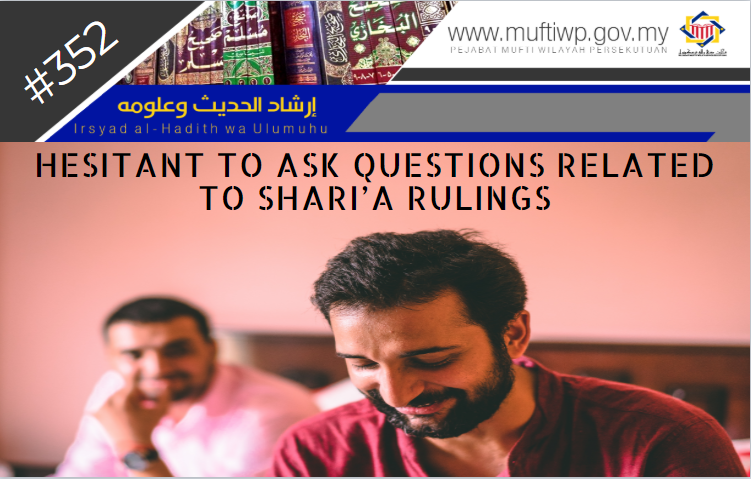Question:
Assalamualaikum wrm.wbt.,
Is there a hadith that states that the Companions were hesitant to ask questions about a certain Shari’a ruling because they were shy?
Answer:
Waalaikumussalam wrm. wbt.
Alhamdulillah, praise and thanks to Allah for the countless blessings He has blessed us all with. Blessings and salutations to the Prophet Muhammad PBUH, his wives, his family, companions and all those that follow his teachings to the day of judgement.
Shame is one of the commendable attributes from the branches of faith as stated in a sahih hadith:
- From Abu Hurairah RA, the Prophet PBUH said:
وَالحَيَاءُ شُعْبَةٌ مِنَ الإِيمَانِ
“…modesty, bashfulness, and scruple, etc.) is a part of faith.”
Sahih al-Bukhari (9)
Syeikh Mustafa al-Bugha when giving commentary on this hadith said shamefulness (modesty) is an attribute of a human and this attribute encourages humans to do commendable deeds and leave what is disgraceful and contemptible. According to the above question, there is a hadith narrated by Saidina Ali bin Abi Thalib RA who said:
كُنْتُ رَجُلًا مَذَّاءً فَأَمَرْتُ المِقْدَادَ بْنَ الأَسْوَدِ أَنْ يَسْأَلَ النَّبِيَّ صَلَّى اللهُ عَلَيْهِ وَسَلَّمَ فَسَأَلَهُ، فَقَالَ: فِيهِ الوُضُوءُ
I used to get the emotional urethral discharge (pre-seminal discharge/ madhy) frequently so I requested Al-Miqdad to ask the Prophet (ﷺ) about it. Al-Miqdad asked him and he replied, "One has to perform ablution (after it)."
Sahih al-Bukhari (132)
Imam al-Bukhari placed this hadith under the chapter “A shy person asking another to ask on his behalf.” Thus, from this hadith we can understand and extract several wisdoms or lessons from it as the following:
- Shamefulness should not prevent a Muslim from asking about religious matters except if there is a debilitation which prevented him from asking. At this time, it is permissible for him to get another person asking on his behalf.
- Urethral discharge is the same as urine in terms of its najis status. Hence, it is wajib to wash the place that came into contact with the urethral discharge just as it is commanded to perform ablution (renew the ablution) and not take a bath when he intends to pray or others.
- It is permissible to ask another person to ask on his behalf on the condition that the question is clearly understood by the person who is going to ask it. In other words, the questioner understands the question clearly, able to understand the answer given and convey it back. (See Buhuth fi ‘Ulum al-Hadith wa Nususuhu, 411)
Conclusion
To conclude, shamefulness (modesty) is included as commendable attributes and a symbol of the perfection of a person. However, in the context of education or asking questions related to a certain religious matter then the attribute of shamefulness should be set aside for the religion commanded it as so except if there is a debilitation that prevent us from asking and make it so that we have to ask another person to ask it on our behalf. Moreover, there are also a statement from a renown tabi’in scholar, Imam Mujahid who said:
لَا يَنَالُ الْعِلْمَ حَيِيٌّ وَلَا مُسْتَكْبِرٌ
“Knowledge can never be attained by the shy and arrogant.”
Lastly, may Allah SWT make us from among His slaves who are shameful to commit sins towards Him. Amin.
Wallahua’lam.


